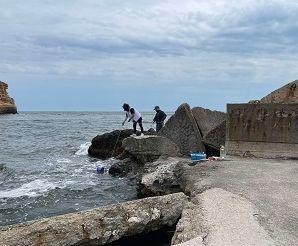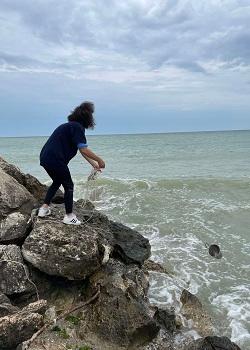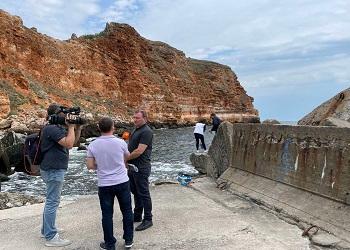No data for pollution in Bulgarian Black Sea waters
20 Jun, 2023 | 11:20
- “To date, the satellite observations and the digital modelling of water currents do not provide cause for concern,” said Yavor Dimitrov, director of the Black Sea Basin Directorate.
- The new observations show that the potential pollution is receding from the Romanian border, which means that there is no evidence that the Bulgarian border will be reached.
The Ministry of Environment and Water (MOEW) is conducting comprehensive monitoring of possible environmental damage in the Bulgarian Black Sea waters following the destruction of the wall of the Nova Kakhovka dam, located on the Dnieper River in Ukraine.
The Black Sea Basin Directorate and the Regional Laboratory - Varna of the Executive Environmental Agency (EEA) carried out the assigned weekly monitoring of coastal sea water quality at three coastal sites - Durankulak, Shabla, and Kaliakra.
“To date, the satellite observations and the conducted digital modelling of water currents do not provide cause for concern,” said Yavor Dimitrov, director of the Black Sea Basin Directorate.
The new observations show that the potential pollution is receding from the Romanian border, which means that there is no evidence that the Bulgarian border will be reached.
According to a summary of the latest analyses, which includes the weather forecast for the period from June 6 to June 24 by the Centre for Integrated Coastal Zone Management and Monitoring at the Naval Academy "N. Y. Vaptsarov", and satellite observations, no objects have been identified that could be classified as pollution.
The new data sent by the Institute of Space Research and Technology at the Bulgarian Academy of Sciences to the Black Sea Basin Directorate shows that no pollution around Odessa in the Bulgarian Black Sea waters could be detected.
It should be recalled that the Minister of Environment and Water Julian Popov commissioned on June 8 the Basin Directorate "Black Sea Region"- Varna and the Executive Environmental Agency to conduct an enhanced monitoring of coastal sea waters, which is carried out at three sites in coastal waters - Durankulak, Shabla, and Kaliakra, while the Ministry of Environment and Water established three additional monitoring sites located in the coastal zone.
Additional indicators are included in the current monitoring to track the potential impact of the Dnieper River waters on the Black Sea. Monitoring is carried out weekly at coastal sites.
The location of the stations observes coastal accessibility opportunities, the direction of the dominant currents, and the bathymetric data available for the area. The potential risk of pollution of the marine environment due to military activities will be monitored. The presence of petroleum products, metals, the radionuclides caesium-137 and tritium are monitored and additional indicators (pesticides, etc.) are included in response to the emerging situation. To date, no excess quantities have been detected for any of the indicators examined.
The condition of not only coastal but also inland water currents is monitored. The monitoring of the state of the marine waters is coordinated with the Ministry of Tourism with a view to a peaceful tourist season.
The frequency of sampling is sufficient to make an objective assessment of the current state of marine waters. The results will be made available to the competent authorities in due time, in accordance with the time required to analyse the indicators on-site.
The MOEW exchanges information on a daily basis with the Ukrainian, Moldovan, and Romanian authorities on potential pollution of Black Sea waters.
On 16 June, Minister Popov successively coordinated joint actions with his Romanian and Ukrainian counterparts. For more information on the meetings, click here.
The role of the MOEW is to monitor and inform the institutions responsible for preventing and responding to identified risks. Up-to-date information on the results from the measurements will be provided to the competent institutions and the public in due course.
Signals in cases of possible signs of pollution along the coastline can be submitted to the Green Phone of the Ministry of Environment and Water: 0887 088 440 or 02/9888205, as well as to e-mail address: nccw@moew.government.bg, and also to the Green Phone of the Regional Inspectorate of Environmental Protection - Varna: 0884 290 634 or 052/634 582, Regional Inspectorate of Environmental Protection - Burgas: 0889 096 577 or 056/813 212, and Basin Directorate Black Sea Region - Varna. 0886 406 816.
Dear media representatives,
The MOEW Press Centre is at your disposal for further questions related to Bulgaria Black Sea waters monitoring.
E-mail address: press@moew.government.bg


